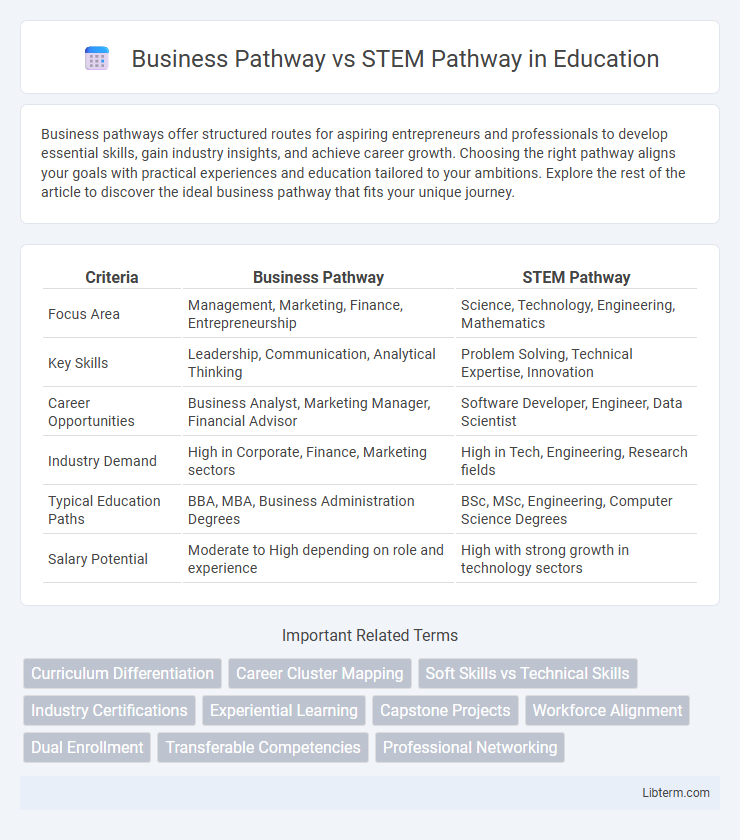Business pathways offer structured routes for aspiring entrepreneurs and professionals to develop essential skills, gain industry insights, and achieve career growth. Choosing the right pathway aligns your goals with practical experiences and education tailored to your ambitions. Explore the rest of the article to discover the ideal business pathway that fits your unique journey.
Table of Comparison
| Criteria | Business Pathway | STEM Pathway |
|---|---|---|
| Focus Area | Management, Marketing, Finance, Entrepreneurship | Science, Technology, Engineering, Mathematics |
| Key Skills | Leadership, Communication, Analytical Thinking | Problem Solving, Technical Expertise, Innovation |
| Career Opportunities | Business Analyst, Marketing Manager, Financial Advisor | Software Developer, Engineer, Data Scientist |
| Industry Demand | High in Corporate, Finance, Marketing sectors | High in Tech, Engineering, Research fields |
| Typical Education Paths | BBA, MBA, Business Administration Degrees | BSc, MSc, Engineering, Computer Science Degrees |
| Salary Potential | Moderate to High depending on role and experience | High with strong growth in technology sectors |
Introduction: Defining Business and STEM Pathways
Business Pathways focus on developing skills in finance, marketing, management, and entrepreneurship to prepare students for roles in the corporate and commercial sectors. STEM Pathways emphasize education in science, technology, engineering, and mathematics, fostering innovation and technical expertise essential for careers in research, engineering, and technology fields. Both pathways offer specialized curricula tailored to distinct career goals and industry demands.
Core Curriculum Differences: Business vs. STEM
The Business Pathway core curriculum emphasizes courses in finance, marketing, management, and economics, fostering skills in strategic planning, communication, and financial analysis. In contrast, the STEM Pathway prioritizes mathematics, science, technology, and engineering courses, focusing on problem-solving, technical expertise, and analytical thinking. These distinct curricular focuses prepare students for specialized career tracks by developing either business acumen or technical proficiency.
Career Opportunities and Job Market Trends
The Business Pathway offers diverse career opportunities in finance, marketing, management, and entrepreneurship, with job market trends emphasizing digital marketing, data analytics, and financial technology roles. The STEM Pathway focuses on careers in engineering, computer science, biotechnology, and environmental science, driven by high demand for artificial intelligence specialists, software developers, and renewable energy experts. Both pathways present growth potential, but STEM fields tend to showcase faster job market expansion due to technological advancements and innovation.
Skill Sets Required for Success
The Business Pathway demands strong analytical thinking, financial literacy, effective communication, and leadership skills to excel in areas like marketing, management, and entrepreneurship. The STEM Pathway requires proficiency in mathematics, scientific reasoning, technical problem-solving, and programming to succeed in fields such as engineering, computer science, and biotechnology. Mastery of critical thinking and adaptability is essential across both pathways to navigate evolving industry trends and technological advancements.
Earning Potential and Salary Comparison
Business Pathway careers typically offer strong earning potential in roles such as finance, management, and marketing, with median salaries ranging from $60,000 to $120,000 annually depending on experience and location. STEM Pathway jobs, especially in engineering, computer science, and biotechnology, often command higher starting salaries, frequently exceeding $70,000, and can surpass $150,000 with advanced expertise or specialization. Salary growth in STEM fields tends to be faster due to high demand and technological innovation, while Business roles may provide broader opportunities for leadership positions influencing overall compensation.
Long-term Career Growth and Advancement
The Business Pathway emphasizes skills in management, finance, and marketing, offering long-term career growth in leadership roles across diverse industries with steady advancement opportunities. The STEM Pathway focuses on expertise in science, technology, engineering, and mathematics, often leading to rapid innovation-driven career progression and high-demand technical positions. Both pathways provide strong potential for advancement, but STEM careers typically command higher starting salaries and faster skill evolution, while Business careers excel in strategic leadership and organizational development.
Personality Fit and Student Interests
The Business Pathway aligns with students who demonstrate strong leadership skills, communication abilities, and a penchant for strategic thinking, catering to those interested in entrepreneurship, management, and marketing. The STEM Pathway suits analytical, detail-oriented students passionate about innovation, problem-solving, and technology in fields such as engineering, computer science, and mathematics. Choosing between the pathways depends on individual personality traits and interests, guiding students toward careers that match their strengths and long-term goals.
Industry Demand and Future Prospects
The Business Pathway aligns with growing demand in sectors like finance, marketing, and entrepreneurship, driven by globalization and digital transformation, offering broad career opportunities with strong growth potential. The STEM Pathway meets critical needs in technology, engineering, and healthcare industries, fueled by innovation and automation trends, promising high-demand roles and lucrative salaries. Future prospects for both pathways depend on adaptability to evolving market trends, with STEM fields generally exhibiting faster employment growth but Business Pathway roles benefiting from expanding digital economies.
Program Challenges: Academic Rigor and Workload
Business Pathway programs demand strong analytical skills and extensive case study analysis, presenting challenges with complex financial modeling and market research projects that require consistent time management. STEM Pathway students face rigorous coursework involving advanced mathematics, coding, and lab experiments, often balancing multiple technical assignments and collaborative research tasks. Both pathways require high levels of discipline and adaptability to navigate intense academic workload and maintain performance across diverse subjects.
Making the Right Choice: Factors to Consider
Choosing between a Business Pathway and a STEM Pathway involves evaluating personal interests, career goals, and market demand. Individuals drawn to analytical problem-solving, innovation, and technology trends may thrive in STEM fields such as engineering, computer science, or biotechnology. Conversely, those interested in leadership, finance, marketing, and entrepreneurship should consider business programs that emphasize strategic thinking, economic principles, and communication skills.
Business Pathway Infographic

 libterm.com
libterm.com